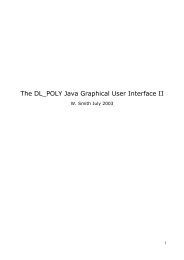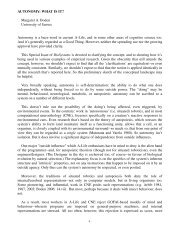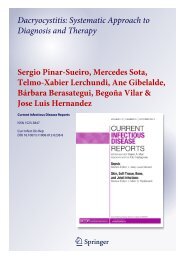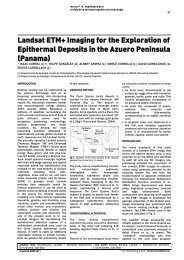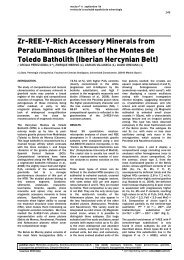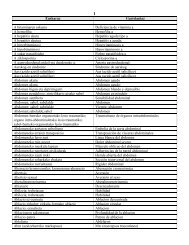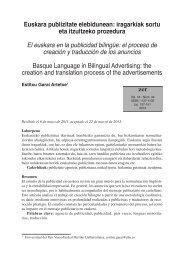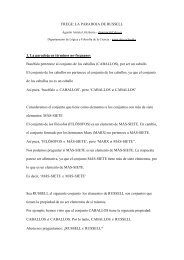- Page 2 and 3: Pedro Barea Monge. UPV/EHU Jean-Jac
- Page 4 and 5: Aurkibidea / Índice / Summary PRÓ
- Page 6 and 7: Dispositivos, tecnologías y aplica
- Page 8 and 9: eredua Euskadi Irratia: Identity an
- Page 10 and 11: MARTÍN SABARIS, Rosa; POZAS, Víct
- Page 12 and 13: Ponentziak Ponencias
- Page 14 and 15: Pedro Barea lives. But how deep wou
- Page 16 and 17: Pedro Barea traciones con todos los
- Page 18 and 19: Pedro Barea 18 Brecht, en un gesto
- Page 20 and 21: Pedro Barea 3. Profecías antiguas
- Page 22 and 23: Pedro Barea masiado previsible en l
- Page 24 and 25: Pedro Barea de Huxley, Wu ha puesto
- Page 26 and 27: Pedro Barea VVAA. (2004). IGES, Jos
- Page 28 and 29: Francesc Cano y Kílian Sebrià lla
- Page 30 and 31: Francesc Cano y Kílian Sebrià lle
- Page 32 and 33: Francesc Cano y Kílian Sebrià que
- Page 34 and 35: Francesc Cano y Kílian Sebrià de
- Page 36 and 37: Francesc Cano y Kílian Sebrià Roc
- Page 38 and 39: Francesc Cano y Kílian Sebrià es
- Page 40 and 41: Tim Wall tecnología en la que se b
- Page 42 and 43: Tim Wall 2. Radio and technology Al
- Page 44 and 45: Tim Wall sets through early evening
- Page 46 and 47: Tim Wall vities across a wired worl
- Page 50 and 51: Tim Wall other words, it assumes th
- Page 52 and 53: Tim Wall poke streamed music for us
- Page 54 and 55: Tim Wall GRANLUND, N. T. (1957). Bl
- Page 56 and 57: Pedro E. Martínez 1. Historia de l
- Page 58 and 59: Pedro E. Martínez Según el invest
- Page 60 and 61: Pedro E. Martínez 3. Medio siglo d
- Page 62 and 63: Pedro E. Martínez Radio Habana Cub
- Page 64 and 65: Pedro E. Martínez Informáticas mu
- Page 66 and 67: Conflicto con la radio. La naturale
- Page 68 and 69: Pedro Paniagua 68 1. Derecho a la i
- Page 70 and 71: Pedro Paniagua mecánica por una m
- Page 72 and 73: Pedro Paniagua muertas. Quizá sea
- Page 74 and 75: Pedro Paniagua 74 Radio y fútbol:
- Page 76 and 77: Pedro Paniagua bolística sin cubri
- Page 78 and 79: Pedro Paniagua Bibliografía (artí
- Page 80 and 81: 1. mahai-ingurua / Mesa 1 La radio
- Page 82 and 83: Verónica Ruiz “La necesidad de r
- Page 84 and 85: Verónica Ruiz 84 - Personalizació
- Page 86 and 87: Audio bajo demanda y podcast en las
- Page 88 and 89: Alejandro López de complemento a l
- Page 90 and 91: Alejandro López 1.2 ¿Radio local
- Page 92 and 93: Alejandro López creación de grand
- Page 94 and 95: Alejandro López porcentaje de minu
- Page 96 and 97: Alejandro López único archivo sup
- Page 98 and 99:
Alejandro López Analizando el cruc
- Page 100 and 101:
Alejandro López Es importante adem
- Page 102 and 103:
Alejandro López Guardian, (Consul
- Page 104 and 105:
Toni Sellas 0. Introducción. Catal
- Page 106 and 107:
Toni Sellas la radio en España con
- Page 108 and 109:
Toni Sellas contenidos y ofrecer a
- Page 110 and 111:
Toni Sellas sentado la edición ver
- Page 112 and 113:
Toni Sellas Algunos de los comentar
- Page 114 and 115:
Toni Sellas 114 Imagen 4. Perfil de
- Page 116 and 117:
Toni Sellas con cifras que multipli
- Page 118 and 119:
Toni Sellas 12-15 October 2010. TAA
- Page 120 and 121:
Jorka J. Palacio 1. Hardware para e
- Page 122 and 123:
Jorka J. Palacio máximo en el futu
- Page 124 and 125:
Jorka J. Palacio 124 ta audiovisual
- Page 126 and 127:
Jorka J. Palacio se estaban a media
- Page 128 and 129:
Jorka J. Palacio 128 El 7 de junio
- Page 130 and 131:
Jorka J. Palacio pasar muchas horas
- Page 132 and 133:
Jorka J. Palacio Un lector de libro
- Page 134 and 135:
Jorka J. Palacio 134 - Reverb esté
- Page 136 and 137:
Jorka J. Palacio Si AmpliTube es un
- Page 138 and 139:
Jorka J. Palacio Con el gran porcen
- Page 140 and 141:
Aplicación del podbean en la docen
- Page 142 and 143:
Ana Mendieta y Maria Ganzabal y los
- Page 144 and 145:
Ana Mendieta y Maria Ganzabal los p
- Page 146 and 147:
Ana Mendieta y Maria Ganzabal 146 e
- Page 148 and 149:
Ana Mendieta y Maria Ganzabal Aunqu
- Page 150 and 151:
Ana Mendieta y Maria Ganzabal En cu
- Page 152 and 153:
Ana Mendieta y Maria Ganzabal Bibli
- Page 154 and 155:
¿Quién mató a la estrella de la
- Page 156 and 157:
Luis Miguel Pedrero 156 musical de
- Page 158 and 159:
Luis Miguel Pedrero (PARDO y REVERT
- Page 160 and 161:
Luis Miguel Pedrero y hasta la Cade
- Page 162 and 163:
Luis Miguel Pedrero en que sí lo h
- Page 164 and 165:
Luis Miguel Pedrero Es en este punt
- Page 166 and 167:
Luis Miguel Pedrero 166 tales se ha
- Page 168 and 169:
Luis Miguel Pedrero 168 y HERRERA:
- Page 170 and 171:
Luis Miguel Pedrero Bibliografía A
- Page 172 and 173:
La radio creativa: la Hora Temátic
- Page 174 and 175:
Joseba Martín 1. Introducción En
- Page 176 and 177:
Joseba Martín es el teatro de la m
- Page 178 and 179:
Joseba Martín que la figura centra
- Page 180 and 181:
Joseba Martín dio 45, Trenes, cont
- Page 182 and 183:
Joseba Martín Boing 14 y el diseñ
- Page 184 and 185:
Joseba Martín Band), del rapero Sn
- Page 186 and 187:
Joseba Martín 186 dos. “Si quier
- Page 188 and 189:
Joseba Martín escuchar el programa
- Page 190 and 191:
Joseba Martín KEITH, M. (2010): Th
- Page 192 and 193:
El género policíaco en la radio.
- Page 194 and 195:
Elisa Arias 0. Introducción A dife
- Page 196 and 197:
Elisa Arias narrativo planteado por
- Page 198 and 199:
Elisa Arias 198 “El policía es u
- Page 200 and 201:
Elisa Arias primeros actores del cu
- Page 202 and 203:
Elisa Arias 4. Análisis de la esce
- Page 204 and 205:
Elisa Arias analizados en esta comu
- Page 206 and 207:
Elisa Arias el relato, exceptuando
- Page 208 and 209:
Niños, la radio existe ¡Viva la r
- Page 210 and 211:
Chelo Sánchez y Aurora Pérez cont
- Page 212 and 213:
Chelo Sánchez y Aurora Pérez 212
- Page 214 and 215:
Chelo Sánchez y Aurora Pérez a pa
- Page 216 and 217:
Chelo Sánchez y Aurora Pérez 216
- Page 218 and 219:
Chelo Sánchez y Aurora Pérez 218
- Page 220 and 221:
Chelo Sánchez y Aurora Pérez Exis
- Page 222 and 223:
Chelo Sánchez y Aurora Pérez NIET
- Page 224 and 225:
Iratxe Hernández obra que Muñoz p
- Page 226 and 227:
Iratxe Hernández escrito que me ha
- Page 228 and 229:
Iratxe Hernández Esta pieza, en or
- Page 230 and 231:
Iratxe Hernández Muñoz -el tambor
- Page 232 and 233:
Iratxe Hernández sombra” (Muñoz
- Page 234 and 235:
Iratxe Hernández efectos…), la d
- Page 236 and 237:
Iratxe Hernández dad intelectual c
- Page 238 and 239:
Iratxe Hernández 6. Buenas noches
- Page 240 and 241:
Chusé Lois Fernández 0. Introducc
- Page 242 and 243:
Chusé Lois Fernández una radio qu
- Page 244 and 245:
Chusé Lois Fernández En la actual
- Page 246 and 247:
Chusé Lois Fernández Robert Adria
- Page 248 and 249:
Chusé Lois Fernández Esto signifi
- Page 250 and 251:
Chusé Lois Fernández presentan co
- Page 252 and 253:
Chusé Lois Fernández El creador d
- Page 254 and 255:
Chusé Lois Fernández Ésta será
- Page 256 and 257:
Cande Sánchez, Raúl Rodríguez y
- Page 258 and 259:
Cande Sánchez, Raúl Rodríguez y
- Page 260 and 261:
Cande Sánchez, Raúl Rodríguez y
- Page 262 and 263:
Cande Sánchez, Raúl Rodríguez y
- Page 264 and 265:
Cande Sánchez, Raúl Rodríguez y
- Page 266 and 267:
Cande Sánchez, Raúl Rodríguez y
- Page 268 and 269:
Cande Sánchez, Raúl Rodríguez y
- Page 270 and 271:
Cande Sánchez, Raúl Rodríguez y
- Page 272 and 273:
Cande Sánchez, Raúl Rodríguez y
- Page 274 and 275:
SANTÍN DURÁN, M. (2009): La autor
- Page 276 and 277:
María Marcos 0. Introducción Seg
- Page 278 and 279:
María Marcos Por otra parte, las i
- Page 280 and 281:
María Marcos des pasos: Formulaci
- Page 282 and 283:
María Marcos será cada uno de los
- Page 284 and 285:
María Marcos 284 (13), La Rioja (1
- Page 286 and 287:
María Marcos que prima la informac
- Page 288 and 289:
María Marcos Para que el método s
- Page 290 and 291:
María Marcos migración y minoría
- Page 292 and 293:
María Marcos IGARTUA, J. J. (2006)
- Page 294 and 295:
Aizkolaris de neutrones. Comunicar
- Page 296 and 297:
Francisco Javier San Martín Alguno
- Page 298 and 299:
Francisco Javier San Martín Es igu
- Page 300 and 301:
Francisco Javier San Martín Para d
- Page 302 and 303:
Francisco Javier San Martín poster
- Page 304 and 305:
Francisco Javier San Martín Ademá
- Page 306 and 307:
Francisco Javier San Martín Depart
- Page 308 and 309:
‘Euskadi Irratia’: Nortasuna +
- Page 310 and 311:
Maria González Azkenik, ‘Euskadi
- Page 312 and 313:
Maria González Bigarrenik, EiTBk
- Page 314 and 315:
Maria González 314 50 40 30 20 10
- Page 316 and 317:
Maria González Dena den, ‘Euskad
- Page 318 and 319:
Maria González Ondorioz, ekonomia
- Page 320 and 321:
Maria González 320 5. Taula: "Eusk
- Page 322 and 323:
Maria González 5. Ondorioak Ikerla
- Page 324 and 325:
Maria González Bibliografia ALKORT
- Page 326 and 327:
José María Chomón 1. Evolución
- Page 328 and 329:
José María Chomón mana. Por las
- Page 330 and 331:
José María Chomón de informativo
- Page 332 and 333:
José María Chomón Llama la atenc
- Page 334 and 335:
José María Chomón su idioma (Fau
- Page 336 and 337:
José María Chomón segundo tipo e
- Page 338 and 339:
José María Chomón La globalidad
- Page 340 and 341:
José María Chomón Bibliografía
- Page 342 and 343:
Hizkuntza gutxituak eta identitatea
- Page 344 and 345:
Irati Agirreazkuenaga beraien norta
- Page 346 and 347:
Irati Agirreazkuenaga “Nazio-iden
- Page 348 and 349:
Irati Agirreazkuenaga ari zitekeen,
- Page 350 and 351:
Irati Agirreazkuenaga multzo baten
- Page 352 and 353:
Irati Agirreazkuenaga hizkuntzaren
- Page 354 and 355:
Irati Agirreazkuenaga baina baita i
- Page 356 and 357:
Irati Agirreazkuenaga newsmen”, J
- Page 358 and 359:
Amaia Nerekan Orain, irratiaren txa
- Page 360 and 361:
Amaia Nerekan Baina, euskarazko irr
- Page 362 and 363:
Amaia Nerekan 362 izanik, diru gutx
- Page 364 and 365:
Amaia Nerekan 3. Tokikotasuna eta e
- Page 366 and 367:
Amaia Nerekan 366 3. taula: Irrati-
- Page 368 and 369:
Amaia Nerekan Jaurlaritzak lizentzi
- Page 370 and 371:
Amaia Nerekan Baina, euskara hutsez
- Page 372 and 373:
Amaia Nerekan ak, alternatiboak,...
- Page 374 and 375:
Amaia Nerekan doien aurrean. Komuni
- Page 376 and 377:
Apreciación estética de la voz Ol
- Page 378 and 379:
Olatz Larrea y Emma Rodero 0. Intro
- Page 380 and 381:
Olatz Larrea y Emma Rodero Se ha ob
- Page 382 and 383:
Olatz Larrea y Emma Rodero radio ca
- Page 384 and 385:
Olatz Larrea y Emma Rodero 4. Resul
- Page 386 and 387:
Olatz Larrea y Emma Rodero 386 Cuan
- Page 388 and 389:
Olatz Larrea y Emma Rodero 388 cimi
- Page 390 and 391:
Olatz Larrea y Emma Rodero Bibliogr
- Page 392 and 393:
La palabra es acción The Word is a
- Page 394 and 395:
Fernando J. Melgosa decir, la palab
- Page 396 and 397:
Fernando J. Melgosa 396 Gráfico 3:
- Page 398 and 399:
Fernando J. Melgosa nada, inevitabl
- Page 400 and 401:
Fernando J. Melgosa palabra resalta
- Page 402 and 403:
Fernando J. Melgosa que se acostumb
- Page 404 and 405:
La radio, una profesión de riesgo.
- Page 406 and 407:
Gotzon Toral, Irene García y Jon M
- Page 408 and 409:
Gotzon Toral, Irene García y Jon M
- Page 410 and 411:
Gotzon Toral, Irene García y Jon M
- Page 412 and 413:
Gotzon Toral, Irene García y Jon M
- Page 414 and 415:
Gotzon Toral, Irene García y Jon M
- Page 416 and 417:
Gotzon Toral, Irene García y Jon M
- Page 418 and 419:
Gotzon Toral, Irene García y Jon M
- Page 420 and 421:
Gotzon Toral, Irene García y Jon M
- Page 422 and 423:
Gotzon Toral, Irene García y Jon M
- Page 424 and 425:
Gotzon Toral, Irene García y Jon M
- Page 426 and 427:
Juan Carlos González yoría un esp
- Page 428 and 429:
Juan Carlos González 2. Metodolog
- Page 430 and 431:
Juan Carlos González 2. Las Tecnol
- Page 432 and 433:
Juan Carlos González 432 CONTENIDO
- Page 434 and 435:
Juan Carlos González Tabla 2: Cont
- Page 436 and 437:
Juan Carlos González 436 “Audiov
- Page 438 and 439:
Juan Carlos González Si atendemos
- Page 440 and 441:
Juan Carlos González 440 Créditos
- Page 442 and 443:
Un punto de encuentro y reflexión
- Page 444 and 445:
Carmen Peñafiel y Joseba Martín a
- Page 446 and 447:
Carmen Peñafiel y Joseba Martín P
- Page 448 and 449:
Carmen Peñafiel y Joseba Martín p
- Page 450 and 451:
Carmen Peñafiel y Joseba Martín d
- Page 452 and 453:
Carmen Peñafiel y Joseba Martín 4
- Page 454 and 455:
Carmen Peñafiel y Joseba Martín d
- Page 456 and 457:
Carmen Peñafiel y Joseba Martín a
- Page 458 and 459:
Carmen Peñafiel y Joseba Martín i
- Page 460 and 461:
La radio y su lenguaje cómplice: l
- Page 462 and 463:
Jon Bilbao propio migrante con los
- Page 464 and 465:
Jon Bilbao reúnen condiciones para
- Page 466 and 467:
Jon Bilbao La AIMC -autora del Estu
- Page 468 and 469:
Jon Bilbao 5. Analisis cualitativo
- Page 470 and 471:
Jon Bilbao En cuanto a las emisoras
- Page 472 and 473:
Jon Bilbao 5.4. La empatía lingü
- Page 474 and 475:
Jon Bilbao man la calidad del conte
- Page 476 and 477:
Jon Bilbao periodismo de la inmigra
- Page 478 and 479:
Irrati-hitza, Jangoikoaren berba: H
- Page 480 and 481:
Arantza Gutierrez Red de Emisoras D
- Page 482 and 483:
Arantza Gutierrez emankizun erlijio
- Page 484 and 485:
Arantza Gutierrez letan, literatura
- Page 486 and 487:
Arantza Gutierrez Araba Bizkaia Gip
- Page 488 and 489:
Arantza Gutierrez Bibliografia ALBE
- Page 490 and 491:
Leyre Romero dad. Además, consider
- Page 492 and 493:
Leyre Romero 492 El 100% de las enc
- Page 494 and 495:
Leyre Romero ley pero las autoridad
- Page 496 and 497:
Leyre Romero Asimismo, la importanc
- Page 498 and 499:
Leyre Romero La mayoría de los con
- Page 500 and 501:
Leyre Romero por lo que se puede co
- Page 502 and 503:
Leyre Romero cuál es la correcta
- Page 504 and 505:
Leyre Romero El integrar a los oyen
- Page 506 and 507:
Cuba: Una radio en construcción. E
- Page 508 and 509:
Rosa Martín, Víctor Santiago Poza
- Page 510 and 511:
Rosa Martín, Víctor Santiago Poza
- Page 512 and 513:
Rosa Martín, Víctor Santiago Poza
- Page 514 and 515:
Rosa Martín, Víctor Santiago Poza
- Page 516 and 517:
Rosa Martín, Víctor Santiago Poza
- Page 518 and 519:
Rosa Martín, Víctor Santiago Poza
- Page 520 and 521:
Rosa Martín, Víctor Santiago Poza
- Page 522 and 523:
María Teresa Santos 1. Introducci
- Page 524 and 525:
María Teresa Santos Las primeras e
- Page 526 and 527:
María Teresa Santos los mismos pri
- Page 528 and 529:
María Teresa Santos des Pelijrosas
- Page 530 and 531:
María Teresa Santos 530 miprofesio
- Page 532 and 533:
María Teresa Santos Tabla 3: Emiso
- Page 534:
María Teresa Santos COULDRY, Nick




